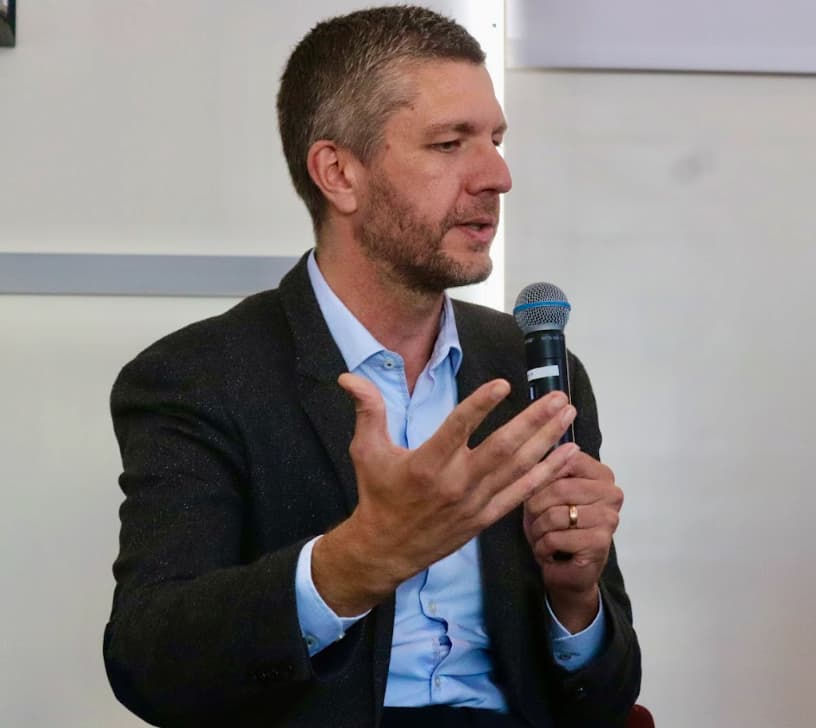From BC to the New York Times
Editor Patrick McGroarty’s (‘06) advice to young journalists: ‘Just be open to different things’
By Madeleine Mulligan ‘27
Patrick McGroarty’s path from college student to professional journalist began with having an open mind.
McGroarty, ’06, who moderated the Oct. 1 “Climate Is Every Story” panel “Public Health, Common Good,” stepped into the position of economy editor for the New York Times just four weeks before. Previously, McGroarty spent almost 16 years at the Wall Street Journal as a senior reporter, Chicago deputy bureau chief, and the health and medicine bureau chief.
McGroarty's journey to the New York Times may not seem conventional, but he says few journalism career paths are.
As a freshman at BC, McGroarty wasn’t sure what he wanted to pursue for a career, but two opportunities shaped his path. The first came when he walked into Fulton Hall to sign up for a German class, and Michael Resler, professor of German Studies chair, asked the first-year student if he was interested in becoming a Fulbright scholar. From that point on, McGroarty knew that he wanted to get a Fulbright grant.
He was also interested in journalism, but McGroarty didn’t fully land on it until he interned with the Dorchester Reporter after his junior year—a recommendation from professor of English Carlo Rotella.
When McGroarty finally applied for a dreamed-of Fulbright grant his senior year, he was rejected. Though it seemed like a major setback at the time, McGroarty stumbled upon a stroke of luck—the Dorchester Reporter had an opening for one of its few full-time jobs.
In retrospect, said McGroarty, the position was “this incredible gift from the universe, an opportunity to get a great job in journalism even if it all felt like not what I was expecting.” First jobs are often half steps or adjacent to what many young journalists set out to do, but they are essential for getting experience. “Even when I was starting, I was like: I'll try it, and if it doesn't work, it won't work,” he said.
While he enjoyed his time at the Dorchester Reporter, McGroarty still had Fulbright ambitions. He applied again, and his second application was successful. As he embarked on his Fulbright scholarship to Germany in 2007 after a year with the Reporter, he knew that journalism was the career he wanted to pursue—and that he wanted to start abroad. Knowing that journalism is a difficult profession to break into, McGroarty said, “I wondered whether I would have better luck in a place where you needed local language skills,” and could put his German Studies major to good use.
His first foray into “big media” journalism involved reporting in Berlin, first for the Associated Press and later the Wall Street Journal, covering German politics and economics as the European debt crisis began. While at the Wall Street Journal, he moved to Johannesburg, South Africa, where he covered political and economic stories in Africa.
McGroarty loved his time as a reporter in Africa, but in 2016 he chose to return to the United States and step into his first editorial role as the Wall Street Journal’s deputy bureau chief in Chicago. In hindsight, McGroarty realizes how fortunate this move was, because it allowed him to discover where his true talents lay within journalism.
“It gave me all the time between then and now to learn how to be a really good editor,” said McGroarty. “And I determined somewhere along the way that I actually really love it and I think it’s really well suited for my particular skillset.”
At the Wall Street Journal, McGroarty became the health and medicine bureau chief in New York, where he led a team of reporters writing about critical public health topics like the Covid-19 pandemic, the opioid crisis, and cancer.
McGroarty attributes his current success to happenstance and taking advantage of new opportunities that came. Eventually, he followed those open doors to his current role helping to lead economics coverage at the New York Times. His advice to budding journalists: “Just be open to different things,” and don’t expect your career to look exactly like you’ve planned.



